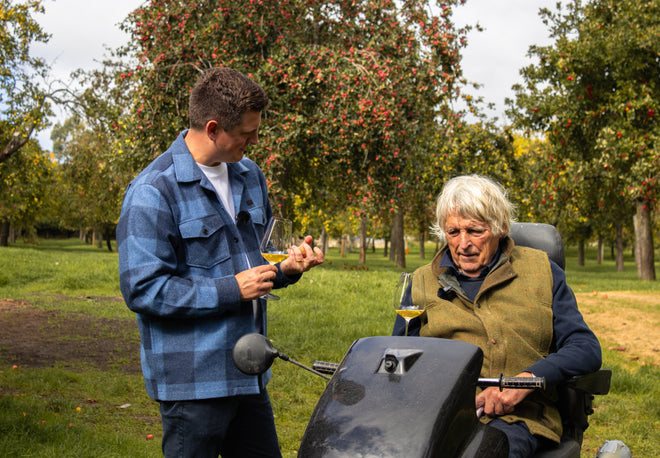
22/10/25
Speaking with Julian Temperley of The Somerset Cider Brandy Company
There are few places in England quite like Burrow Hill, home of The Somerset Cider Brandy Company. Perched among rolling orchards heavy with fruit, it’s here that Julian Temperley has spent decades reviving one of Britain’s oldest traditions.
There are few places in England quite like Burrow Hill, home of The Somerset Cider Brandy Company. Perched among rolling orchards heavy with fruit, it’s here that Julian Temperley has spent decades reviving one of Britain’s oldest traditions.
A farmer, distiller and storyteller in equal measure, Julian embodies the spirit of Somerset itself: resourceful, unhurried and deeply connected to the land. We sat down with Julian among the orchards to talk history, harvests and the art of turning apples into liquid gold.
How long has Burrow Hill been open for? Can you tell us about the history of your orchards and apple varieties?
Cider has been made at Burrow Hill for over 150 years, and our orchards have been part of the Somerset landscape for much longer. My family has been farming here for more than fifty years, continuing a tradition that’s been part of this county for generations.
When I founded The Somerset Cider Brandy Company in 1989, I was reviving an ancient craft, distilling cider into brandy, that had disappeared from England for nearly 300 years. Today, we have over 160 acres of orchards and around 50 varieties of cider apples.
How important is Somerset’s landscape and terroir to the flavour of your cider?
It’s everything. Somerset’s clay and limestone soils, along with the mild, damp climate, are perfect for growing cider apples rich in tannins and flavour.

How do you turn apple juice into cider?
It’s a simple but beautiful process. We press the apples to get the juice, then add yeast or sometimes just let the natural yeasts do the work. Fermentation takes three or four months, depending on the year.
Somerset has such a rich cider tradition. How do locals interact with the orchards? What is Cider Bus Saturdays at Burrow Hill?
The Cider Bus has been a wonderful success. Every Saturday in summer we have around 150 people here, sitting on rugs or in deck chairs, enjoying the cider and the view. It’s become a real community gathering. Then there’s Apple Day, which is a national event and one of our favourites. We usually have 200 to 300 people come down to celebrate the harvest with us. There’s live music, food stalls such as Basement Tacos, and of course, plenty of cider and brandy to taste. It’s a proper Somerset celebration.
What types of barrels do you use to age your brandy?
We use a mix. There are old sherry casks that have held sherry for 20 years, new oak barrels, and quite a bit of French oak. Some of our barrels age cider for five to seven years, and when they’re finished, we use them for Kingston Black and Pomona. After that, many go to Glenfiddich in Scotland. We’ve had a long love affair with them over the years, and our barrels continue their journey up there.

What do you think about the local produce in Somerset?
Somerset’s special because it’s not aristocratic. It’s a county of farmers and craftspeople. We’re just peasant cider producers moving up the scale a bit. We haven’t changed much in a hundred years, and that’s what makes it such a wonderful place.
What’s the main difference between Calvados in Normandy and Somerset Cider Brandy?
The apples are different. They have their own varieties, and we have ours, but the landscapes are remarkably similar. There’s a shared spirit between Normandy and Somerset. We’re both doing the same thing really, celebrating the apple and the land it grows on.














































